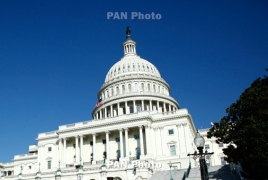
An overwhelming 405-11 vote on H.Res.296 saw the recognition of the Armenian Genocide by the U.S. House of Representatives on October 29. The move was long-anticipated and much coveted, especially given that past attempts were thwarted by concerns that it could damage relations with Turkey, a Nato ally.
Now that the lower house of the Congress has approved the resolution, questions arise as to whether the Senate will follow suit with a similar move.
The document approved by the House was a non-binding resolution, one of those often used to express Congress’s approval or disapproval of something – in this case, the recognition of the Armenian Genocide, a representative from Rep. Frank Pallone Jr.’s office told PanARMENIAN.Net.
“Because it was not a joint resolution (an H.J.Res. or S.J.Res.), H.Res.296 does not need to be passed by the Senate or signed into law by the president in order to take effect,” said Mary Werden, Communications Director.
“The official expression of the House of Representatives is now that the Armenian Genocide occurred and was perpetrated by the Ottoman Turks, per the language that passed in H.Res.296.”
In April, a similar resolution (S.Res. 150) was introduced in Senate by Senators Bob Menendez and Ted Cruz.
“The Senate resolution is not a “companion” bill because the House will not have an opportunity to vote on it,” Werden said in an emailed statement.
“It would have the same effect as H.Res.296, but expressing the sense of the Senate instead of the House. Another important point is that it could be voted on at any point in time if Senate Majority Leader Mitch McConnell would allow it to come up.”
For the time being, however, it is unclear when McConnell will commit the upper chamber of the U.S. Congress to voting on the resolution.
The bipartisan resolution, introduced by Representative Adam Schiff, affirms the U.S. record on the Armenian Genocide, establishes as a matter of U.S. policy:
- commemorate the Armenian Genocide through official recognition and remembrance,
- the rejection of Armenian Genocide denial,
- ongoing official U.S. government recognition and remembrance of this crime, and
- support for education about the Armenian Genocide in order to help prevent modern-day atrocities.

